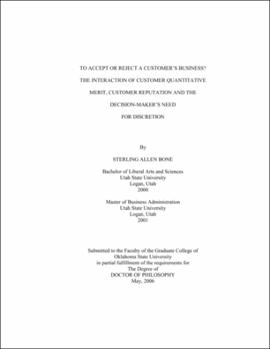| dc.contributor.advisor | Mowen, John C. | |
| dc.contributor.author | Bone, Sterling Allen | |
| dc.date.accessioned | 2013-11-26T08:25:40Z | |
| dc.date.available | 2013-11-26T08:25:40Z | |
| dc.date.issued | 2006-05 | |
| dc.identifier.uri | https://hdl.handle.net/11244/6813 | |
| dc.description.abstract | Scope and Method of Study: This research investigated factors that influence customer selection decisions. Two methods were employed. First, interviews were conducted with bank executives, loan officers, and regulators to identify factors that influence customer selection decisions in retail bank lending. Second, an experiment was conducted with 262 commercial loan officers to test a three-way interaction between customer quantitative merit, customer reputation, and the decision-maker's need for discretion (NFD) on the behavioral intentions to accept or reject a customer's business (i.e., customer selection likelihood). | |
| dc.description.abstract | Findings and Conclusions: ANOVA results supported the three-way interaction. The interaction pattern, however, differed from the prediction derived from cue diagnosticity theory. For low-NFD individuals, the prediction that customer quantitative merit would be the dominant information cue was supported. For high-NFD individuals, the prediction was that customer reputation would be dominant when reputation was positive. When negative, however, quantitative merit would be diagnostic. The results revealed an opposite effect. That is, when reputation was negative, there was no main effect for quantitative merit; however, when reputation was positive, there was a main effect. Additional analyses revealed that NFD did not influence the use of reputation information when quantitative merit (i.e., credit score) was low. A "floor effect" for quantitative merit was proposed as an explanation. When quantitative merit was high, however, NFD influenced the extent to which reputation information affected customer selection likelihood. That is, when quantitative merit was high, NFD moderated the impact of customer reputation, such that customer reputation information influenced high-NFD individuals but not low-NFD individuals. This research will assist managers in understanding how their customer contact personnel interpret information cues to make selection decisions. Policy implications were discussed regarding the potential for customer discrimination. | |
| dc.format | application/pdf | |
| dc.language | en_US | |
| dc.rights | Copyright is held by the author who has granted the Oklahoma State University Library the non-exclusive right to share this material in its institutional repository. Contact Digital Library Services at lib-dls@okstate.edu or 405-744-9161 for the permission policy on the use, reproduction or distribution of this material. | |
| dc.title | To accept or reject a customer's business? The interaction of customer quantitative merit, customer reputation and the decision-maker's need for discretion | |
| dc.contributor.committeeMember | Brown, Tom J. | |
| dc.contributor.committeeMember | Flaherty, Karen E. | |
| dc.contributor.committeeMember | Carter, David A. | |
| osu.filename | Bone_okstate_0664D_1818 | |
| osu.accesstype | Open Access | |
| dc.type.genre | Dissertation | |
| dc.type.material | Text | |
| thesis.degree.discipline | Marketing | |
| thesis.degree.grantor | Oklahoma State University | |
